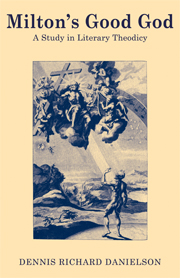Book contents
- Frontmatter
- Contents
- Preface
- 1 The contexts of Milton's theodicy
- 2 God and Chaos
- 3 Assertion and justification: providence and theodicy
- 4 Milton and the Free Will Defense
- 5 Theodicy, free will, and determinism
- 6 Eden and the “soul-making” theodicy
- 7 Paradise Lost and the Unfortunate Fall
- Epilogue
- Appendix: The unfortunate fall of Satan
- Notes
- Selected bibliography
- Index
1 - The contexts of Milton's theodicy
Published online by Cambridge University Press: 04 August 2010
- Frontmatter
- Contents
- Preface
- 1 The contexts of Milton's theodicy
- 2 God and Chaos
- 3 Assertion and justification: providence and theodicy
- 4 Milton and the Free Will Defense
- 5 Theodicy, free will, and determinism
- 6 Eden and the “soul-making” theodicy
- 7 Paradise Lost and the Unfortunate Fall
- Epilogue
- Appendix: The unfortunate fall of Satan
- Notes
- Selected bibliography
- Index
Summary
‘Milton's object … was to justify the ways of God to man! The controversial spirit observable in many parts of [Paradise Lost] … is immediately attributable to the great controversy of that age, the origination of evil.’ This pithy comment made by Samuel Taylor Coleridge in 1818 suggests three overlapping contexts that will be the terrain of the present study, Milton figuring in each of them. First, there is the conceptual context: the so–called theological problem of evil. Secondly, there is the historical context in which Milton tackled the problem: seventeenth–century England, ‘that age’ and its controversies. And thirdly, there is the context in which Coleridge's remark itself arises: that of the literary criticism of Milton and his writings, particularly Paradise Lost. My purpose will be to describe Milton's contribution to the first two of these contexts and in so doing to attempt my own contribution to the third. However much may have been written on Milton, I know of no major work that sets out to elucidate both conceptually and historically the immediate issues of theodicy – of the justification of God's ways – with reference to the great literary achievement that is Paradise Lost. My aim here is to fill that gap. The literary–critical relevance of my project I shall attempt further to justify at the end of this chapter; but first I must introduce contexts one and two, the conceptual and the historical.
- Type
- Chapter
- Information
- Milton's Good GodA Study in Literary Theodicy, pp. 1 - 23Publisher: Cambridge University PressPrint publication year: 1982

